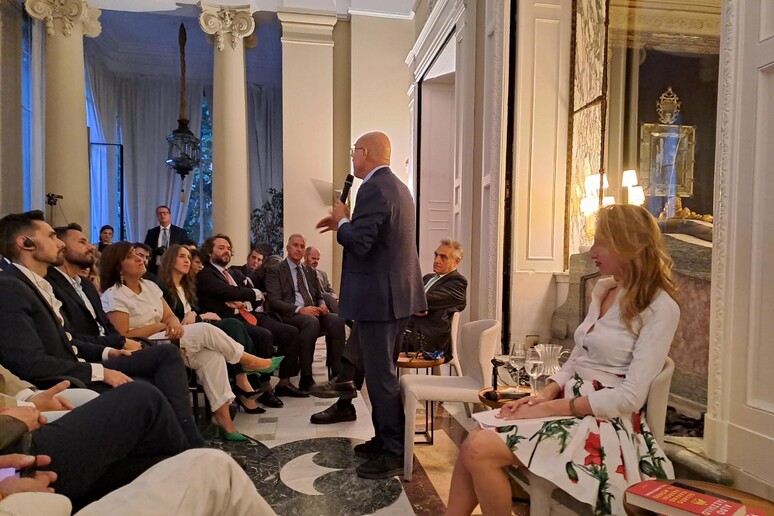A large and enthusiastic audience of readers, history scholars and journalists attended the presentation of Aldo Cazzullo's book 'Roma. El imperio infinito' (Ed.HarperCollins), in a stimulating dialogue with the author on Friday evening at the Italian Embassy in Madrid. "An essay of high historical divulgation" to be read as "an adventure novel", but above all "as a battle in the war against the dictatorship of the present that, consciously or unconsciously, Cazzullo has been waging for years", points out writer Javier Cercas in the prologue to the Spanish edition.
The columnist and deputy editor of the Corriere della Sera, one of the leading interpreters of current political events, was introduced by Ambassador Giuseppe Buccino Grimaldi, who pointed out that "in today's global world and at the difficult time in which international law is suffering, shaken by conflicts in northern and southern Europe, reference to the law, to the Roman empire based on law, is absolutely necessary".
This is the first of over thirty books written by the creator of 'A Particular Day' translated into the language of Cervantes. "Spain is the country I love and where I feel at home," Cazzullo began. And where "the Roman civilisation lives on in the vestiges of architecture, from the aqueduct of Segovia to the theatre of Sagunto, from the walls of Cordova to the mosaics of Palencia, from the amphitheatre of Merida or that of Aragon to the lighthouse of Finisterre".
The foundation of Rome, from the literary myth of Aeneas to that of Romulus, the Republican age, Catiline, Spartacus, "the rebel slave who inspired revolutionaries and coup plotters", above all the story of Julius Caesar and Octavian Augustus, up to the Christianisation of the empire, show that "the West was built on the foundations of ancient Rome", the author explained. An infinite empire that 'lives on in our language, in our thoughts, in our way of thinking'. "In Rome, the Res Publica was born, the idea that the public thing belongs to everyone," Cazzullo recalled. Who considers Julius Caesar "the greatest politician, military commander, writer and journalist who ever lived". "His first tweet in history: veni, vidi, vici is brilliant".
New chapters have been added to the Spanish edition, such as the one on Italy and Spain, 'the country in which we Italians most mirror ourselves, but it is not true that we are so much the same,' the writer remarked, tracing the bonds rooted even in centuries of domination. No era has had as much influence on successive generations as the empire of Rome. Augustus' 'sense of propaganda that helped fuel the imperial cult,' renewed by digital dominators like Mark Zuckenberg - 'on a honeymoon in Rome, his wife said there were three of them, because she had her picture taken wherever there were statues of the emperor' - or Elon Musk. Or the myth of the founding of Rome in Virgil's Aeneid, written in honour of Augustus, in which 'our progenitor is Aeneas, a defeated hero, moved by the sentiment of pietas, loyalty, responsibility and sense of duty, moral principles shared by the Italians with the Spaniards', the author pointed out.
"Rome's dream was the dream of world government, which is the dream of universal peace, also reflected in Tacitus and the pax romana," emphasised Aldo Cazzullo. "And it is the greatest value to which, in these 'mala tempora', we should cling."
ALL RIGHTS RESERVED © Copyright ANSA











